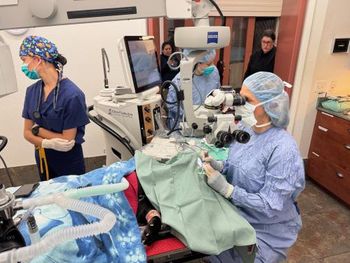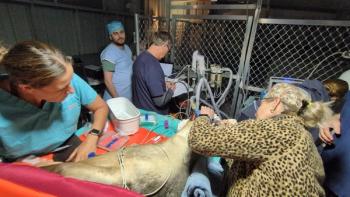
Complicated corneal ulcer: Avoiding disasters (Proceedings)
The primary goal in treating a corneal ulcer is to identify its cause or identify factors that may prevent it from healing well.
Corneal Anatomy
1. Corneal erosion: Superficial: Epithelium
2. Corneal ulcer: Middle: Stroma
3. Descemetocoele: Deep: Endothelium and Descemet's membrane
Most Corneal Ulcers Occur for a Reason
1. Abnormal tear film
2. Abnormal blink motion
3. Decreased corneal sensation
4. Abnormal hairs
5. Inflammation
6. Immune-mediated
7. Degenerative
The primary goal in treating a corneal ulcer is to identify its cause or identify factors that may prevent it from healing well. Therefore a thorough ocular examination should be performed on any patient with an ulcer.
1. Eyelids:
a. Distichia- breed predisposition
b. Ectopic cilia- young dogs, very painful, dorsal erosion
c. Trichiasis- entropion
d. Meibomitis?
2. Conjunctiva
a. Follicles
3. Cornea
a. ulcer depth
b. ulcer character (malacic, infected, indolent)
4. Anterior chamber
a. uveitis (primary or reflex?)
5. Iris
a. Miosis
b. iritis
6. Lens
a. pathology?
7. Posterior segment
a. abnormalities?
Ophthalmic Tests
1. Schirmer Tear Test
a. Normal 15-25, but brachycephalic?
2. fluorescien stain
a. Stains stroma only, will delineate ulcer size
b. TFBUT >20 seconds
c. Undermining epithelial lip?
3. Tonometry
a. Ulcers can commonly occur secondary to rubbing from glaucoma discomfort.
Ulcer Management
1. Treat the underlying cause.
- Surgery for hair removal
- Tear stimulant therapy
- Glaucoma therapy
2. Manage concurrent problems.
- Systemic antibiotics
- Systemic anti-inflammatories
3. Choose antibiotic therapy based on severity of ulcer and predisposition to get worse.
- Triple antibiotic or Gentocin good first line defense
- Tobramycin for pseudomonas infections
- Tobramycin AND Ofloxacin for complicated ulcers
- Plasma for malacic ulcers
4. Consider supportive care.
- Tear replacement therapy
5. Determine if depth warrants surgical correction. (>50% consider)
- Conjunctival pedicle graft
- Cornealconjunctival transposition
- Island graft
- Artificial membrane tissue graft
Miscellaneous tips:
1. If an ulcer is not healing- simply changing antibiotics is not the best approach!
2. Remember atropine will decrease tear production- only use if needed.
Various Complicated Ulcers
Corneal degeneration
- Age related, usually no breed predisposition
- mineral accumulation resulting in corneal tissue sloughing
- Difficult to heal with medication
- Trichlorocetic acid debridement or CPG
Endothelial degeneration
- Age related, breed predisposed (dalmation, dachshund, boston terrier)
- Loss of endothelial cells resulting in accumulation of edema in cornea
- Results in mild to moderate loss of vision
- Can cause corneal bullae and subsequent ulcers and erosions.
- Sodium chloride ointment can slow progress of disease
- Erosions and recurrent bullae treated with laser keratoplasty
Multiple superficial punctuate keratitis
- Breed related (usually Shetland Sheepdog)
- Immune-mediated disease with mulitfocal erosions
- Immunosuppressive therapy required, often for life
Herpes corneal erosions
- Feline chronic issues, epithelial in nature
- Client education is a large treatment!
- Topical antivirals may be necessary
- Preventative therapy includes Genteal gel and L-Lysine
Indolent erosions
- Diagnostic undermining of erosion edges, do not need recurrence
- Q-tip debridement, linear grid keratotomy, multiple punctuate
- keratotomy, superficial keratectomy
Corneal foreign bodies
- Typically removal out the entrance wound
- Beware of possible AC penetration, be prepared for corneal wound surgery
- Very close examination to determine if ANY lens involvement—may need phacoemulsification
Newsletter
From exam room tips to practice management insights, get trusted veterinary news delivered straight to your inbox—subscribe to dvm360.





